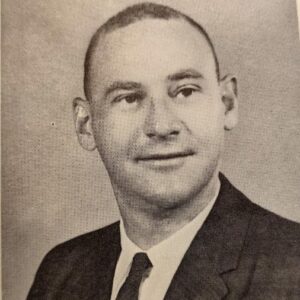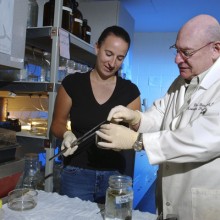Remembering Bernie Fried
By Dave Block ’93
Bernard Fried, 88, who spent 37 years as a member of the Lafayette faculty, died Dec. 21 at Kirkland Village, Bethlehem.
Listed in Who’s Who in America, Fried was one of the world’s foremost experts in the field of parasitology. His research led to important advances in the effort to conquer tropical diseases caused by parasitic flatworms. Of special note is his work on the disease schistosomiasis, which affects at least 200 million people, many in Third World countries.
 The College dedicated the Bernard Fried Research Suite in Kunkel Hall in his honor. At the time of his retirement in May 2000, he was Gideon R. Jr. and Alice L. Kreider Professor of Biology, the first to hold that title since 1975. He continued his prolific research career after retirement.
The College dedicated the Bernard Fried Research Suite in Kunkel Hall in his honor. At the time of his retirement in May 2000, he was Gideon R. Jr. and Alice L. Kreider Professor of Biology, the first to hold that title since 1975. He continued his prolific research career after retirement.
“His dedication to his scholarship was impressive and unwavering,” says Nancy Waters, associate professor of biology. “And the students under his tutelage admired and respected him, almost with a reverence. When I arrived in 1985 Bernie’s office in Kunkel was around the corner, but with retirement, it was just across the hall. So I frequently stopped to say hi and hear the latest about his most recent student accomplishment or another project with his colleague and dear friend, the late Joe Sherma (Larkin Professor Emeritus of Chemistry). Together they were a formidable team, but Bernie always and ever had a smile and a kind word, usually a chuckle, for anyone he encountered.”
“Bernie was a dedicated teacher and a scholar who contributed greatly to my career development and personal growth at Lafayette College,” says Shyamal Majumdar, Kreider Professor Emeritus of Biology. “His enthusiasm and dedication in research appealed to many Lafayette students who conducted research under his capable guidance. Many of his students’ success in their professional fields, I believe, partly was due to Bernie’s dedication and determination in teaching and research. Bernie’s integrity, enthusiasm, and compassion in research attracted my attention soon after I joined Lafayette College in 1969, and he became one of my dependable friends and colleagues in the Biology Department. I will sorely miss Bernie!”
Chuck Holliday, professor emeritus of biology, met Fried when the professor interviewed him for a position as an animal physiologist at Lafayette in early 1982.
“I was impressed with his dedication to involving undergraduates in his research and resolved to follow his excellent example,” he says. “At the time, Lafayette was increasing its commitment to undergraduate research involvement, and Bernie and our colleague Shyamal Majumdar led the way as examples of faculty who involved five to ten undergraduates a semester in their research programs, including co-authorship of publications by their research students.
“Bernie’s many research students well remember the intensity of his interest in the biology of parasitic worms, particularly trematodes. He always had several research projects ready for a willing student to take on, and many of his former research students have told me that Bernie’s excitement about and involvement in research was the reason that they became research scientists. Bernie will be remembered by generations of Lafayette biology majors as a deciding factor in their research careers.”
 As The Chronicle of Higher Education quoted one of his former students, “Who else could make the travels of Nector americanis seem like it should be a Steven Spielberg movie?”
As The Chronicle of Higher Education quoted one of his former students, “Who else could make the travels of Nector americanis seem like it should be a Steven Spielberg movie?”
The Discovery Channel featured Fried in “Parasites: They’re Eating Us Alive,” a one-hour primetime program. The importance of his contributions in the field of parasitology is reflected by the fact that three organisms were named in his honor. In the latest instance, scientists at the University of Valencia, Spain, named Echinostoma friedi for him.
Fried published more than 450 articles, reviews, and books on the applications of thin-layer chromatography to biology and on the biology, physiology, and biochemistry of parasites and gastropods. More than half of these publications were coauthored with Lafayette students.
A number of those students presented their research at annual meetings of the Pennsylvania Academy of Science, of which Fried was a past president and honorary lifetime member. He and Sherma performed interdisciplinary, collaborative research with students as part of Lafayette’s EXCEL Scholars program for more than two decades. During that time, they worked with more than 100 students who went on to publish in academic journals, present at national and international conferences, receive master’s and doctorate degrees, and work in numerous fields. Their collaboration was the subject of a paper in the journal Chromatography.
Fried was editor of a book focusing on new possible avenues of medical research using intestinal parasites called echinostomes, The Biology of Echinostomes: From the Molecule to the Community, as well as the book Echinostomes as Experimental Models for Biological Research. He also co-edited Food-Borne Parasitic Zoonoses: Fish and Plant-Borne Parasites. Fried and Sherma co-edited Handbook of Thin-Layer Chromatography, a 1,016-page volume that features contributions from more than 40 of the world’s leading authorities in the field, and the book Practical Thin-Layer Chromatography: A Multidisciplinary Approach.
In honor of their work together and with students, Fried and Sherma were the inaugural recipients of the Delta Upsilon Distinguished Mentoring and Teaching Award in 2000. The professors also shared Lafayette’s Mary Louise Van Artsdalen Prize for outstanding scholarly achievement in 1989.
Early in his career, Fried took a two-month trip to Costa Rica, Honduras, El Salvador, Guatemala, Mexico, and Panama to study parasitic diseases through a grant from the National Institute of Allergy and Infectious Diseases.
In 2003, Fried led the Infectious Disease & Molecular Microbiology and Immunology Joint Seminar hosted by the Johns Hopkins Bloomberg School of Public Health.
He also served on a panel that assisted the University of Texas at Dallas in establishing an undergraduate biology curriculum.
Among many other professional memberships, he was president of the New Jersey Society of Parasitology, an executive council member of the American Society of Parasitologists, associate editor of the ASP Newsletter, life member of the International Society of Chemical Ecology, and on the editorial board of the Journal of Helminthology.
In addition to the Van Artsdalen Prize shared with Sherma, Fried received Lafayette’s Thomas Roy and Lura Forrest Jones Lecture Award in 1967 and Superior Teaching Award in 1970 and 1979. His research was supported by grants from the National Science Foundation, National Institutes of Health, Clark Foundation, Research Corporation, and Burroughs Wellcome Fund.
He was acting head of the Biology Department for the 1970-71 school year.
Fried earned his Bachelor’s of Arts degree in biology from New York University in 1954, master’s in zoology from University of New Hampshire in 1956, and doctorate in zoology (parasitology) from University of Connecticut in 1961. After serving as a National Institutes of Health Postdoctoral Fellow with the Department of Biology at Emory University, he was appointed assistant professor of biology at Lafayette in 1963 and promoted to associate professor in 1969.
